Podcast: Download (Duration: 47:42 — 43.9MB)
Get Notified Of Future Episodes Apple Podcasts | Spotify | Amazon Music | Android | Blubrry | Gaana | TuneIn | Deezer | Anghami | RSS | More
Podcast highlights:
02:44 – Differentiating a job from a business
03:48 – The laptop dependency test
11:30 – What is your business model?
13:13 – From Brent’s studio to the present
19:27 – What could happen while you’re away?
28:45 – When to take action
30:45 – The relationships you form
36:27 – Re-calibrating along the way
43:08 – The main point of the episode
Transcription:
James: James Schramko here. Welcome back to SuperFastBusiness.com. Today, a very, very special episode, because it’s been a little while between episodes and part of the reason is, for the last month or so I’ve been travelling and the team have been putting up some information on the website while I’ve been away. But that’s really the subject of today’s podcast. Today’s podcast is called The Travel Test – How To Know If You Have A Solid Business Or Really Just A Job. And I’ve got a special guest here with me, Brent Mail. Welcome to the call.
Brent: Thanks for having me, James.
James: You pretty much invited yourself on the show. I’m just kidding. When I was away in Europe, you sent me a message and you said, “Hey, would you like to go to Fiji and surf for a week?” And I said, “Sure.” And that’s basically how that happened.
So you and I have just spent the last week in tropical paradise Fiji, surfing the aqua blue waves over shallow coral, improving our surfing ability. And during that week we had some wonderful experiences, and we thought it would be a great idea to share some of the nuances to this.
And we should also step back a little bit and let our audience know a bit about who you are, Brent, and also how we met a few times in the past. So first off, you are a photographer and you have a website called ShareInspireCreate.com. Is that right?
A little background on Brent
Brent: Yes, that’s right. And that’s kind of my values. I used to have my name on it, but then I just wanted to get away from my name, because it’s not about me, it’s about the people that I can help.
James: Well, here at SuperFastBusiness.com, we can relate to that.
Brent: Cool.
James: Creating something bigger than our own name. It is kind of tied into our topic, though, which is starting to look at the differences between a job and a business.
Job vs Business
When you have a job, for example, the person who would take us in a maxi taxi with our surfboard bag to the airport, that person generally has a job, because they’re driving in a taxi. Now maybe they own the taxi, and maybe they own a few taxis, and they lease them out to other drivers. And if that were the case, they start to look more like a business owner. Because if they’re not going to drive the next shift, the taxis will still circulate, the money will still come in from the lease rental, and the business will continue.
So this is a really interesting topic and something I’ve been through personally researching for the last few years. And a big turning point for me was when I went to the Maldives the first time. And I’ve been there several times now, maybe four. I’m coming up the fifth time soon. And the first time that I went away, my big sort of goal was to be able to take that week away without a laptop.
“How dependent on your laptop are you?”
That was one of my tests. It was one test is, can I take time away from my business without a laptop? And that can be hard to do if you are dependent on the laptop. But if you’re dependent on the laptop, it might also mean that your business is dependent on you. So that was one of my tests, and certainly for Fiji, I didn’t take a laptop. Or a razor blade for that matter. Just having a proper holiday away from having to do things that might involve a laptop.
Now, I’ve got my business to the point where there’s not many things that I can’t do these days just from my phone. And that was one of my filters, if you like. Now, that’s not going to be the case for everybody, and it depends on what you do and how involved you are in your business. But it’s a great starting point, because if you are thinking about, ‘How am I going to go away for a week without a laptop?’ the next thing is like, well, ‘What things aren’t going to happen?’
Task transfer
And that list that you create, that starts to be the seed document for what I call a task transfer. And that is, ideally, see if you can transfer those items off the list somewhere else. Either they don’t need to get done at all, they could be deleted from your routine. Maybe they could be automated with technology. Maybe you could have someone else in your team do them.
And that was the big one for me. Most of the items got transferred to someone else. The really fiddly ones were editing of media and sending out e-mails from my e-mail system. And I got this whole idea of being one layer back. What if I only had to access Slack? And in Slack is my team.
And then what if my team could access my e-mail system? What if my team could access my helpdesk? What if my team could access the website software and make those sort of changes? And that was super liberating.
So that’s really one thing to note down, is how dependent on your laptop are you? Because it’s an indicator as to how dependent the business is on you. It’s a job slash business question that might be revealing.
Brent: Definitely. James, I just want to say that, you know, I was really travelling with you for a week and watching you run your pretty profitable business just from your little phone, which was really impressive for me. Because I brought a laptop along. I mean it’s a small laptop, but being a photographer, you know, I kind of need it, especially when I’m editing images on the road, because I’m feeling inspired and I’m taking photos and I want to do it. That’s kind of my creative outlet. But seeing you run your business from your phone was super impressive for me.
James: Yes. Well, I thought of you specifically when I was saying that in some cases it’s not going to be practical. As a visual person, you’re a very visual person and an artist and creative.
Brent: Yeah.
James: It’s good to have those tools on hand when you want them. You know, like you could go to the wild hills of Africa or a snow glacier somewhere in the Himalayas, and you’ll find a photographer or videographer with a beaten up laptop stuffed in their backpack, because that’s the tools of the trade.
So you are probably the exception and not the norm in terms of who would be listening to this podcast. I think we have a lot of artists, but what I’m really speaking to are those amongst us who are still tempted to log in and start changing our website, for example. There’s really no reason for an entrepreneur to be a website developer and to run a business, unless you want to be a website developer. Does that make sense?
A stress test
Brent: Yeah, definitely. And I tested all this, too, when I used to run my studio and we went away for three months in a little caravan up the east coast of Australia. I did the kind of the stress test of my business, whether I could still run a studio where, you know, I was supposed to be the photographer there and photographing families and models and all sorts of things.
And we did it. I still made a profit over three months being away. And some of the places you go to, you’ve got no connection even on a phone. Like especially at the outback in Australia, there’s nothing. So yeah, it’s definitely a good stress test. And I’ve heard Tim Ferriss talk about this too. He says you should see if you can go away for four to, I think it’s four to eight weeks, and if your business dies when you’re away for four to eight weeks, then it’s just a job that you got. Not a real business.
The business model element
James: Right. Yeah, well, there’s definitely some elements that we get to choose. Like, I’m thinking about the different business models that are available. This is what’s really going to determine if that’s possible.
Certainly before I sold my service businesses, they were running themselves for years. They were actually generating their own traffic, servicing the customers, and they weren’t requiring me in any capacity. Some people look at my coaching and they think, well, that business wouldn’t survive for four to eight weeks without me, and that would be true. But I’ve leveraged it very heavily by having my own app. Makes it super convenient for me to access my own business, and having my own time schedule is very, very important.
The business is there to check in on when I feel like checking in on it. It doesn’t have particular time, SuperFastBusiness, that is. With SilverCircle, it’s very interesting because it pretty much gives me my entire week except for two appointments a week. And the two appointments are set in stone, and that’s the routine that sets you free.
Now this is a choice of mine, to be so personally involved, because I know that’s a common complaint of other coaching programs , is you’ll never actually speak to the coach. They’re not accessible. There’s no access. And this is something I want to be able to offer and I enjoy a lot and have a good experience and skillset for. So I actively choose it, but still within my portfolio, there are two other profit streams that do not require me to be present at all and especially at any particular time.
One of those is not in the online or business space, and the other one is more of the revenue share-type deals where I get paid a royalty for ideas and contributions in the past. And I can choose to continue to top those up or not. But what I have done with those is I’ve bundled most of my portfolio into my regular coaching as well, so that it continues to power up my royalty agreement.
So we’ve really hit on a couple of points there. You especially uncovered the super test, Brent, and that is, can you go away from your business on a holiday, perhaps somewhere nice, like in my case Europe, and then come back? And can you have more money sitting in your bank account than when you left? That’s the ultimate test.
Brent: Definitely.
James: If you could do that, then you’ve got things set up right. So it might be worth in this episode to have a look at some of the things that you need to set up for that to happen. And of course, the big one that we’ve already talked about is the business model. Your business model is going to be a huge factor in terms of allowing you.
“Your business model is going to be a huge factor in allowing you freedom.”
So if you’re driving a taxi, that’s not much of a business model – that’s exchanging time for money. So anything that directly exchanges time for money or a wage or a job of sorts is not going to allow you to accumulate wealth while you’re away, unless you have a particularly good employee contract or paid annual leave as part of your package. That’s the technical way that you could do it. But it’s not as leveraged as other business models.
Some of the more leveraged business models are information products, which can be selling every day, all day, 24/7, and they don’t require you once you’ve created it. There’s other ones like affiliate income, commissions on recurring products are quite sweet income sources, and I’ve been enjoying those for a decade now.
And then of course if you want to build a service business or a software business, you can build a team around you so that the team, for example Google or Facebook, they’ve built teams around them to be doing all the coding, and the programming, and the support, and the business development, and the monetization of it. And they can step back and have plenty of holidays. I imagine it would be extremely hard for the owners of Google to come back from a holiday and have less than what they left, because they’ve got quite the machine.
Let’s talk about your change between the studio and what you’re doing now, Brent, I think that would be interesting for our listeners.
Changing the business model
Brent: Yeah, for sure. And part of that was having that freedom to travel. You know, I wanted to have geographic independence. When I ran my studio, even though I took those three months off with the family in the caravan, to really make good money, I needed to be around. And also, I had, I guess I had a ceiling for who I could actually attract into my studio. People wouldn’t drive more than an hour to come and be photographed by me, so I could only attract from like an hour’s drive away.
So those are kind of the two reasons – geographic freedom and also the ceiling for what I could earn and who I could actually help in the world. And I wanted to help everyone, because that’s who I am. I want to help people take great images. And also, I’ve also got a business side to my online teaching, where I help photography business owners make money. At least get started and make money.
So I kind of followed your advice, James. I saw you speak a number of times, I’ve been to a few of your events in Sydney and the Maldives. And yeah, that’s kind of the mindset I had when I started this business. I wanted that freedom to travel and make money and also help a lot more people than I could when I ran my studio. So that’s why I started this business online.
James: Excellent. So when you go to a trip like the Maldives, do you have a specific agenda in mind?
Why travel?
Brent: I did. I wanted to hang with other online business owners and just feel their energy. I see everything maybe different to other business owners. But I see everything as energy, now. It’s not so much time management, it’s energy management for me. So I wanted to hang around with other successful online business owners, because you know, I don’t know who says it but there’s a great saying, I think it’s something like ‘You become the average of the five or six people you hang around with the most.’ And imagine hanging around with, you know, 10 or 12 successful online business owners. I mean, it’s got to rub off on you somewhere.
And it did. I mean, after the Maldives, I have had some amazing results in my business. I totally changed a lot of things. And I’m seeing the results now, which is amazing. And obviously, I got to surf with you and hang with all these people and you know, make some like lifelong friends with the other people that were on the boat.
So yeah, it’s definitely a pivot point in my online business life and I see all these trips that I take, and this one that we’ve just taken to Fiji. I often gauge my business as before the Maldives and after the Maldives, and before Fiji and after Fiji. You know, where was I before in my business and my personal life, I guess. And then where was I after that trip. And every single time when I go on one of these trips, it’s better afterwards than before. Business wise and, I guess, happiness wise in my personal life.
James: So much happens, doesn’t it, when you go away and then you come back? Like we wouldn’t have gone to Fiji if we hadn’t have gone to the Maldives because I wouldn’t really have known you that well and it was good to develop that. I enjoyed watching you create an e-book while we were away, from the start of the trip to the end, with disciplined little work sessions. You were able to move that product forward. And that one time effort now will compound into continued sales for people who want to learn the topics covered in your e-book. It might be worth you mentioning what that’s about, because of the amount of effort that you’ve put into it. I think it warrants that.
Brent: Yeah, definitely. That’s the e-book I’ve been working on is a third edition of an e-book I wrote about six or seven years ago. But it’s been about five years between the second edition and the third edition, which I’m just about to launch, so I’ve put a lot of effort into rewriting it and putting basically my best images from the last five years of travelling the world in there. And I wanted to create something that’s going to help a lot of people. It’s basically the fundamentals of photography that this book’s all about, and it’s kind of the building blocks you need to really understand photography and get those amazing images.
And do you remember me talking to Kyle the youngster the one night in Fiji, who is a budding photographer and I helped him a little bit. You know, he was photographing us surfing and I changed settings and everything and he wants to buy a camera and all the stuff. And I mentioned the artist’s analogy and I said, “Kyle, you know, think of yourself as an artist and not a photographer and your camera as your paintbrush.”
You know, you’ve got to learn the fundamentals, the basics of photography and then you’ve got that tool to use to paint whatever’s in your mind. You’re the creative artist once you understand what your camera can do and all of this, it’s a tool, it doesn’t matter what make, what model you got. It’s your tool after that. But there are some certain basics that you’ve got to understand and that’s what this e-book is all about, it’s the basics of photography.
So yeah, I’ve put a lot of effort into it. And I was looking for that final kind of inspiration to get it done and I got that in Fiji and that’s kind of what I wanted to get on this trip. Often when I’m travelling, I get inspired by my surroundings, especially a beautiful place like Fiji. And I’ve actually, the cover for this book is an aerial photo I took of the surf and the coral in Fiji. I was really inspired, so I got down and I finished this book eventually. Five years in the making and it’s done.
When you travel
James: Wow, that’s great. It was good to watch that come through. And it’s interesting when we go away, we get shifted, don’t we? We have all these things happen from the time we leave home. And they’re not always smooth. Lots of things happen that are unplanned for. We had many of them on this particular trip.
I always think now, going to Fiji to surf is hard work compared to most of the other places I go to, even living at home. It’s just much harder because you have fickle weather, there’s winds, there’s coral reefs. You have to get a boat. Often the sun doesn’t come out for a while. It’s humid. Things don’t dry and the food can be a bit difficult to get tuned up, especially if you’re gluten free. And then of course being on an island is scarce resources with some things. Sure, you can book a rental car, doesn’t mean they’re going to have one when you get there. And you know, little things like that.
You know, when you travel, no matter where, and same with Europe, where I went through about eight different countries, you do deplete your energy fairly quickly on a daily basis because you have this, you’ve got to learn new communication, sometimes new languages. You’ve got to figure out how to eat. You’ve got to find out where you’re staying. You’ve got to keep your eyes out for safety and security concerns.
I mean it starts at the airport, even in Paris. When I came out of the airport, you know, the non-authorized transport people are trying to snipe you and take you in their own option. It doesn’t take long to get off track. And then of course, you’re sleeping in different beds. You’ve got different temperatures, different noises. Everything’s really set against your energy. And if you’re going into that environment and still trying to move forward with your business, you could be definitely an optimist.
“Decline, sustain, or gain?”
What can happen if you go away?
I usually now realize that if I can go away, there’s really three modes that can happen. One is your business could decline, which is very common. I imagine that’s the most common scenario, like when you go away, everything stops. And then when you come back you make it all up again. That’s the decline mode.
The good or favorable outcome would be a sustained mode, which is where your business can sustain while you’re away without you having to do too much.
And then the third one is gain mode. It actually grows while you’re away and continues to snowball. And that’s when you have things like automation happening. So the way that I have people joining my programs is automated. The funnels are all set up and leveraged. The podcast that I’ve done for years are out there, still being listened to on a daily basis. There are systems for the team and they can create content from nothing and publish it, and syndicate it, and email about it without anything happening from my perspective. They can communicate with each other.
This is more of a highly evolved business. And when you get back, of course, that’s when you find out, what happened? You get some measure, like how did we do? What’s our scorecard look like? Did someone step up and take a leadership role? Did someone slink into the background and not do much while you were away? Did things break? Did you have bad customer service? Did you get refund requests? Did something not launch as per plan?
Or if you’re lucky and you’ve got things running well, you come back to an empty inbox, team’s doing what they’re supposed to be doing, most of your customers probably wouldn’t even know whether you had been away or not unless they’re following you on Instagram. And you know, that’s a sweet scenario.
But you’ve switched business models from having that studio to being a traveller. And even though you’re taking a laptop, that’s not a negative score against you because of what you do, because you’re creative. In fact, you add a few extra bits of equipment. You have your tripod and DSLR camera and of course, your most favorite, beloved object on the planet. Can you guess what I’m talking about?
Brent: Mavic.
James: Your drone, that’s right. You love your drone. I’ve never seen anyone sit there and drain three batteries in succession. But you love your drone and the footage that you get from it is amazing. You know things about drones that I reckon probably Mavic don’t even know about drones, because you’ve pushed every single limit and explored every possible barrier that you can break through with that thing. You’ll get three separate alerts on any flight, from collision avoidance to low battery. It’s fascinating to watch.
Brent: To high wind. Yeah, I definitely pushed the little drone on this trip. You know, flying off a boat in 25-knot winds, 18 nautical miles off the coast, was an interesting one. Then you’re talking about draining three batteries, and that was just photographing down on coconut trees. You know, because I was looking at the shadow, how the shadows were in early morning, how the shadows were forming off the trees and shooting down and having that shadow.
It’s just an amazing perspective as a photographer to have a bird’s eye view on things that you’ve never seen before unless you’re in a helicopter. And even in a helicopter, you can’t get that low over a palm tree or a coconut palm to get those kind of shots. So yeah, I’m loving that drone. And to me, it’s just another tool. It’s like a camera. It’s just another tool to use in a very creative way to get your vision across to people, to your audience. Yeah, I love it.
James: What would you say to someone who listens to this podcast and they might have seen the Maldives offer coming up, we’ve got SuperFastBusiness.com/Maldives. We have hired this 100-foot plus boat. There’s not that many people coming on the boat. It’s fully catered for. And by the way, it is significantly easier than the Fiji trip because you get off the airplane in Mali, walk onto a dhoni, which is a small boat. You go to the big boat, and from then you’re on the big boat for the week. And then you get taken off the boat and put back on the plane after a week. So you actually have no effort expended. All food is prepared. The beds are comfy. The view is amazing and you could do nothing or you could be as active as you want. So what would you say to someone thinking about going on that? You know, because you’ve been on that same trip.
Why travel to Maldives?
Brent: I would say go, as simple as that. I’m looking at, you know, before I went to the Maldives, where my business was and then after the Maldives. And I made a couple of little, I put a few pointers down here of what I actually gained on that Maldives trip. Firstly, just hanging with all those people that are successful online people is amazing. And getting to know them on a more personal level, it’s crucial I think for any business owner, having time to actually sit around and have a beer with someone or you know, sit on one of the different decks. I think it’s got three decks if I remember right, James? You can go right to the top.
James: Well, there’s the front, the back, there’s the inside lounge. There’s the very, very top. And then there’s the back at the top. There’s at least five, not including your own room, if you really want to just veg.
Brent: Yeah, totally and I think the big thing for me from that trip was belief. I got belief that I could actually do this online thing and make a go of it and make a real business out of it. You know, I’ve been doing it for a few years and you have your ups and downs and you try things and some things work and some things don’t work and you know, I guess as a business person, you doubt yourself sometimes, whether you can actually do it.
And like, everyone around you is saying, you know, maybe you can’t do it or maybe you’ve got to go get a job. And you know, I was having nightmares about maybe actually having to get a job some time and work for someone again. I could never think about that. But being on that boat with other people that are successful online gave me the belief that I could do it. That was the big thing for me.
And then also having the resources, so actually meeting these people on a personal level; getting ideas of what I’m going to do and how I’m going to change my business; sitting down with you, James, and having a one-on-one, you know, looking at my business and you saying well maybe you should consider this or go this way or do this. And then coming back after that trip and taking action – oh, I even took action on the boat, actually, and got some results.
James: You did. I think you sent an e-mail out and started the wheels turning because you know there’s no need to wait till you get back. There is actually WiFi in between and you can start implementing if it’s been a sticking point. And I know with you, when you get inspired about something, that’s the time to act.
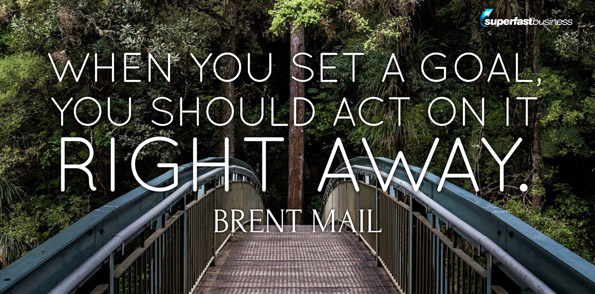 Brent: It is. And I believe when you set a goal, you should act on it right away. Otherwise, you know, there’s the possibility you’ll never actually do anything towards that goal. So I always do that. I set a goal and then I take action straight away, at least the first bit of action. So I came back and I re- kind of designed my business. I tweaked a few things. And what happened was the resources from the people that I met was what actually changed my business.
Brent: It is. And I believe when you set a goal, you should act on it right away. Otherwise, you know, there’s the possibility you’ll never actually do anything towards that goal. So I always do that. I set a goal and then I take action straight away, at least the first bit of action. So I came back and I re- kind of designed my business. I tweaked a few things. And what happened was the resources from the people that I met was what actually changed my business.
So I met a few key people on that boat. I became friends with them. When I came back, I needed a good copywriter for instance, and I called up Liza and I said, “Hey, who are you using?” And she gave me a person’s name and I used them and it was amazing. So you’ve actually got these contacts, these friends that you’ve made on the boat. You’re with them for a week, you know, you socialize and you’re seeing them and you’re actually doing these activities together – surfing or scuba diving or snorkelling or whatever it is and you know, you’re pushing yourself outside of your comfort zone with people, you become friends. There’s some kind of bond after doing adventure activities together, so you can call them up afterwards and say, “Hey, would you suggest someone, who can I go for this?” “What’s working for you?”
And you got these other resources that you can use after the trip and that’s, I think that was key for me to actually get my business to the next level, was using those resources and actually using the people and communicating after the actual trip.
“You spend a week with someone, you become friends.”
James: I think it’s true that you become friends. You spend a week with someone you become friends and you learn a lot of depth around people. But also, they’re more than willing to reciprocate and share ideas and resources. And that’s a good thing. It’s like in your case and my case, over the last week, we must have paddled into quite a few head high waves that had a lot of energy and it’s good doing that knowing that someone’s hooting and supporting you, but also they’ll come and drag you out of the water if you somehow hit your head or whatever. It’s nice to know that you’ve got someone trustworthy and they’ve got your back.
Someone got your back?
Brent: Yeah, watching your back. Yeah. And I think that that relates over to business too. You’ve got someone watching your back in business. So if you’re in a spot where you’re in a little bit of trouble, you got people you can call and reach out to. And that want to help you because they know you and they like you and they trust you.
James: I think a lot of the magic happened even just around the dining room table. You know, with breakfast, lunch and dinner together sitting there chatting. So many amazing conversations. There was an unstructured and a structured element to the trip. Remember, we also had workshops before dinner each afternoon. We addressed specific topics and shared good examples and case studies.
Brent: For sure. That really helped. And also the story about the boat and the struggle to actually build that boat and get it launched and get the business going. I mean that’s just really inspirational. And also, just the beautiful surroundings. I mean I’m a very visual person and being there in that aqua perfect water around you all the time and having the little tropical storms come over and rain every now and again, it’s just amazing being in such a beautiful surrounding. You can’t come away not inspired. And you know, for me inspiration is a huge part of my business. I’ve got to be inspired to be creative to actually create amazing content and inspire the people that are following me. You know, that’s part of my job, I see, and that’s why I called my website ShareInspireCreate, because those are the values that I guess, you know, are me. And that’s what I want.
I want to help people. I want to inspire them. I want them out there creating beautiful images and I want to share what’s going on with me, too. Share the images that I create and also share stories about life and all sorts of things. So yeah, I love it. That trip was key in my business. It was definitely a turning point in my online business and I would say to anyone who’s maybe in the same place as me, has been doing something online and maybe they are struggling a little bit or they don’t quite know where to go or they don’t know who to ask for help, go on this trip. I know that your business will change and also you’ll come away with a bunch of new friends that are doing the exact same thing that you’re doing and that are there, that actually want to help you after they get to know you.
James: Yeah. And I guess I should chime in here and say I will definitely help with your business if you come on the trip because that’s what I do. My job is to look after businesses. The other thing is, sometimes I hear people fall in this trap – they’re like, I’m too busy, it’s not a good time or whatever. And that’s because they haven’t built their business strong enough to sustain being away from it for just one week, and they haven’t built their business strong enough to generate enough income to spend a few thousand dollars on their own education for a more than likely tax-deductible business trip. And I feel that that’s unfortunate. I think that’s one of the reasons you asked me if I want to go to Fiji, right? Because a lot of people just simply aren’t available.
“What does that money allow you to do?”
Brent: Well yeah. I mean pretty much none of the people that I know are available. They can just go in two weeks’ notice or three weeks, say, “Hey, let’s go to Fiji.” “Yep cool, let’s go. Let’s book the flights.” OK, we got the flight. Let’s look at accommodation and we just go. I mean how many people have that freedom? And that’s why, I mean that’s the whole reason why I built this online business, is to have that freedom to go wherever I want, whenever I want, with whomever I want. That’s the whole reason why I did it. For me, it’s not so much like earning masses of money. It’s what does that money allow me to do? And what does that money allow my life to look like? And for me, it’s the freedom to just do things like this. Go on adventures with you, James. Surfing some amazing waves, you know, watching you drop in on some of those big waves. I mean I was simply impressed, by the way. I hope your knee is OK.
James: Yeah, I’m fine. I had a good surf today, first surf back. I think my surfing has changed. That something’s elasticized from before I went away to now. I’ve spent a week surfing bigger waves and scary sort of hollow reef break and today was just so much easier. There was not even a notion of panic and the waves were every bit as big, because you change.
Brent: Well, I think that’s what happens. You recalibrate things. You change. You definitely do. And going to a foreign country, even like a third world country like Fiji or Maldives is, I mean not everything goes according to plan always, and that’s the same as business. So you’ve got to kind of duck and weave and go with the flow. And I think that helps you when you come back. In business, to say, “Hey you know what, stuff doesn’t always go according to plan. But that’s OK. I’ll just change and I’ll do this and I’ll do that.”
James: It’s how you react to it and deal with it that makes the story, really. Like it started for me early. The maxi taxi that I booked didn’t come to take me to the airport so I’ve got them sorted out. My seat on the plane wouldn’t recline for four hours so I was sitting upright. When we got to there, the car rental that I’d booked was not there and then the next three desks didn’t have one either. When we did find one, it was such a delightful car. It had a flat tire and half a tank of fuel. And over the next week, the tire ran completely flat and we had to get that repaired.
You might send a picture if you’ve got one of us where we have our tire repaired. We’ll put a few pictures on this post.
Brent: Totally.
My first surf, I smacked the side of my board on the boat edge and cracked it and then I smashed my knee, which resulted in quite a potentially surf-ending week. But I managed to pull through that and then couldn’t repair my board easily because there wasn’t enough sun. Forgot my booties on the boat so I went to this razor sharp reef with no booties the next day. We had all sorts of other fun, didn’t we? You found toilets with no toilet paper. There was very little food that I could eat for a day or two. I lost kilograms on this trip.
Brent: You were training the staff, the cooking staff.
James: I was training them, training them over a week. They get a much better sense of what gluten free means now after a week, which is good. And I was really quite ill for a few days there with a bronchial chest cold because it was so much colder than I remembered in January and that wind whipped up. My barriers dropped low enough to let a cold through that no doubt came from my Europe trip. So all of that aside, I still had a fantastic week. I learnt a lot about myself and my discipline of getting myself better and not missing a single surf session, which is good. I almost did, but I predicted that it wasn’t going to pan out very well and it didn’t, which is lucky. I made an educated guess there.
And then back today, this is the other thing. Everything today was so unbelievable. The coffee, amazing. The air, the waves here, the convenience of surfing. I actually went out for a surf for an hour and a half and then back home in the same time it would take us to get out to the reef on the boat. I had incredible food and the beds were comfortable.
Brent: Yeah. Some of the spots we went to, they took a lot of effort to get out to and our frigate’s passage was what is it? 15 or 18 miles out to sea. On a boat over some bumpy waves. I mean there was a lot of energy expended to get out to them and then you come back to Australia.
James: Oh, it was an hour of chop, yeah. That’s what I like about the Maldives. You just dive off the back of the boat into the line-up.
Brent: Yeah, and it’s warm. Really warm.
James: It’s warm. Really warm and gorgeous So that was all very interesting, and I’m actually putting together a little video of my Europe trip where I’ve documented, actually there was over 500 videos so I’m going to have to edit it back a bit. And I’m doing this one myself, because I’m interested in capturing the experience again. So this is a choice to do this one. Normally I’d give it to the team. But it’s talking about all the different things, even down to travel packing tips. I travel really light and that just makes an easier experience. But also when I was over there, I spoke at an event, so I’ve videoed lots of in-between moments and some tourist attractions. So if listeners are interested in that, I’m gonna post that up soon and get some feedback on it. If that’s good, then I might do a few more of those.
So Brent, we’ve had a great discussion. I want to say, you were a really good travel buddy. You’ve become friends of mine since we went on the Maldives trip. And that means, you know, the compound effect of our relationship, hopefully it’s really prosperous for your business and it’s definitely prosperous for my surfing. Having someone who can surf better than I can, guiding me onto the big waves. Your infectious enthusiasm and your creative eye for nature and the right shot and your drone flying certainly added a lot to the trip. People would be lucky if they could travel with you. And I just want to say how much I appreciated the experience and I know this book that you’ve been working on is going to be phenomenal. You can get it from ShareInspireCreate.com and all the other courses and what not. Brent, you’ve got all sorts of things over there.
Brent: Yeah. Thanks James, and I really appreciate, you know, taking me up on that message I sent you and being my adventure travel buddy because there’s no one else that’s free. And yeah, I really enjoyed travelling with you, man. And also like calling you on to waves where maybe I shouldn’t call you onto. And I’m glad you can understand now not to always listen to me when I’m going, “Go James, go go go.” And you’re just going to get crunched. I just get excited about things, man.
The main point
James: I just look at it and think, nah, surely that’s a joke. But you know, self-preservation is still alive and well. But it’s been a great sort of growth experience over the years. We’ll put up some pictures from our adventure. The main point about this episode is don’t be afraid to travel. Get out there. If your excuse for not going on a travel adventure is because you don’t have the time, or you can’t afford it, or your business isn’t ready yet, then really, you’ve got to push that paradigm. That’s an indicator that you’re stuck. You’ve probably got the wrong business model. You don’t have much of a team in place yet or any systems, not much leverage happening. So if you want to get those things fixed, you should come to the Maldives because I’ll help you fix them with my little team and with the other members that are there. Most of these problems have been solved. All the other people on the boat have made it a priority to get on the trip and to spend a week helping each other and I’ll be helping as well.
Brent: Definitely go guys. If you want to change your business and change your life, go to the Maldives. I highly recommend it.
James: Yup. So that’s happening in September. If you got any questions, ask my friendly support team, but we’re getting closer to the event. And if you’re a SuperFastBusiness member, be sure to log into the membership and check for your special coupon. And same if you’re a SilverCircle member. You also get a special rate. Look forward to seeing you on the boat.
Brent: Yeah. And by the way James, can I say one last thing?
James: You can.
Brent: I’m really enjoying that personal thread in SuperFastBusiness. James answers your questions. So I’ve been using it quite a lot, guys. I’ll go in there. I put my goals down actually and a couple of questions for James or one question and he’s in there every day answering questions. I love that, because it kind of keeps me accountable. I put things in there, when I get to my goal I let him know that I’ve got to my goal and I put in my next one. He might ask you a question or two about, is that the right direction you should be going or maybe you should do this, so that personal coaching thread in SuperFastBusiness, that is amazing.
James: Yeah. Appreciate it. And you know, you saw me operating that from the other side of it, which is me accessing the community via my app. But we were able to do that at any time of the day in any location and that’s been a beautiful system. I’ve been helping some of my other customers set things like this up for themselves and to get that leverage so that they can also enjoy a similar situation.
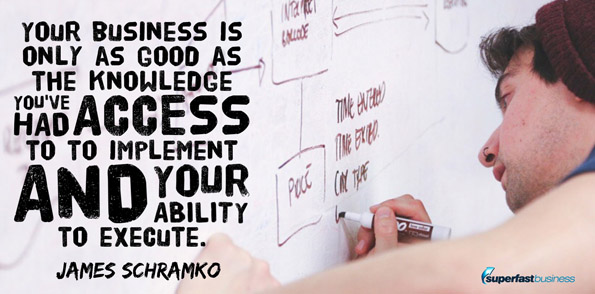 So remember, your business is only as good as the knowledge that you’ve had access to to implement and then your ability to execute. So if you need some inside help, happy to do that.
So remember, your business is only as good as the knowledge that you’ve had access to to implement and then your ability to execute. So if you need some inside help, happy to do that.
Some tips
Some other little tips before you go away on your trip. Write stuff down. And I use a journal actually to store a few notes. Take a picture of it so that you’ve got a picture in the cloud there if you need to remember something. There’s almost nothing you can’t just look up these days. While I was away, I looked up a mind map on Dropbox. So I asked my team to look up some things on Slack. At no point did I need a laptop, which was great.
The other thing is, put a block through your scheduler and then relax, like have some time off. I think most entrepreneurs just don’t have a decent holiday when they’re running a business. And it’s essential to do that to sharpen the saw. And the more time that you take off, the more you learn about your business and the more growth opportunity you have when you get back to fix it. So, Brent?
Brent: Yeah and you’ll be a different person when you come back from that adventure trip. I mean I am, on every single trip I go, I’m a different person when I come back because I’ve learned new things and I’ve been with new people and I come back with new eyes. I see things differently than before I left.
James: There you go. So that’s been Brent Mail, my special guest talking with us today from ShareInspireCreate.com. And James Schramko here. If you’ve enjoyed this episode, be sure to give us a ratings on Apple or Android. There are some pictures that accompany this post at SuperFastBusiness.com. Look for the episode called How To Know If You Have A Solid Business Or Really Just A Job.
Stay on top of new episodes, be sure to subscribe to the Podcast HERE

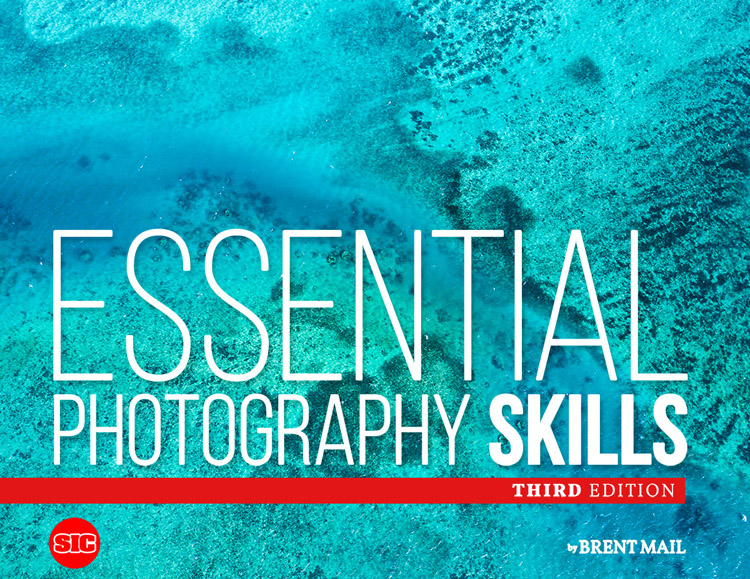
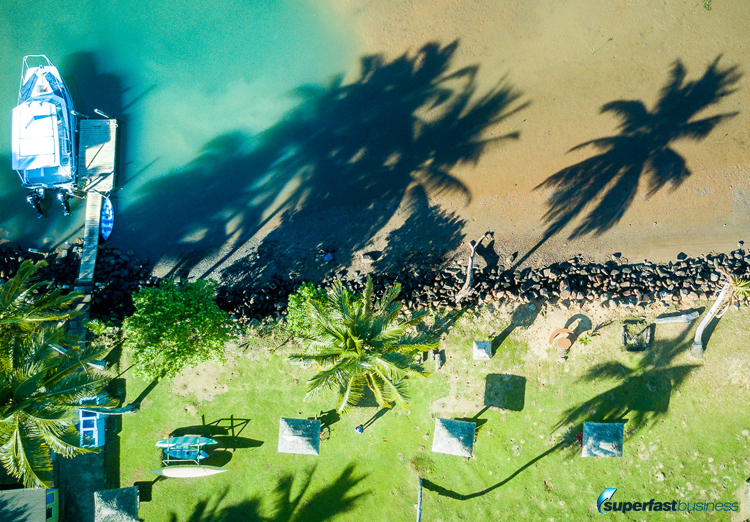
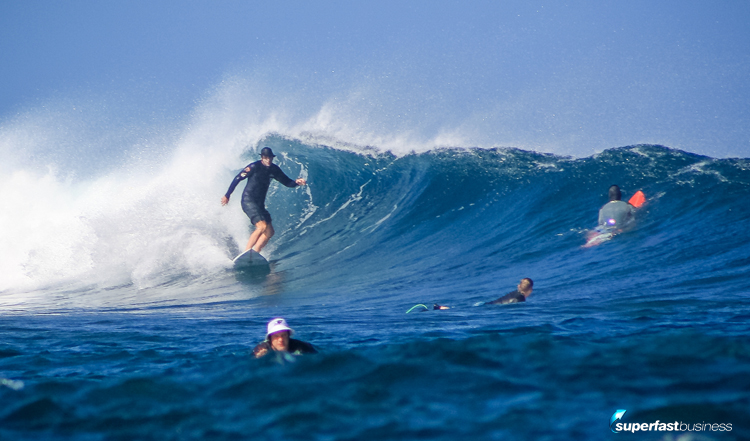
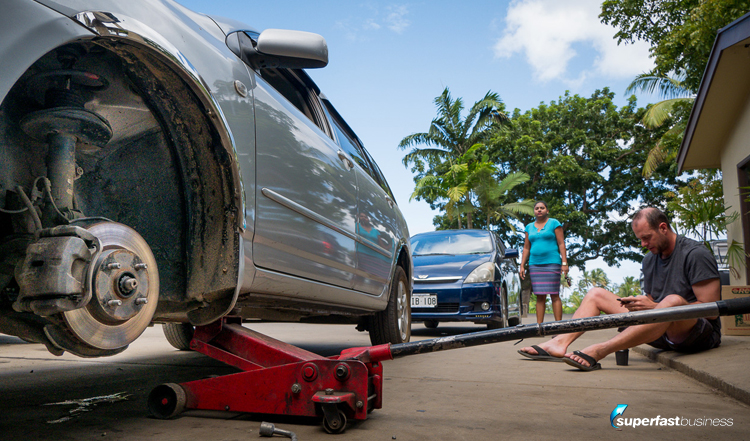
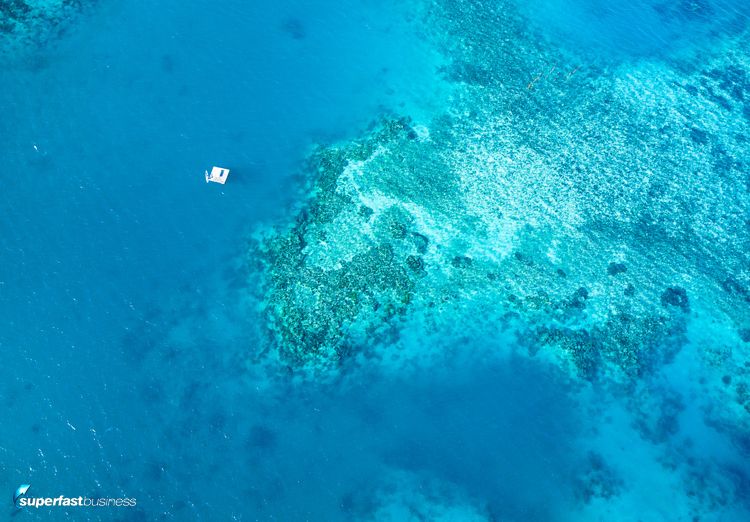
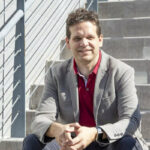
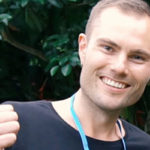
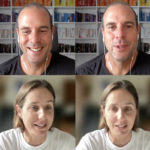






Great interview / discussion. Enjoyed it. Where were you surfing and staying in Fiji, is that shot of you at cloudbreak or frigates? Would love to jump on one of these surf trips reckon it would be great for the soul.
Great interview / discussion. Enjoyed it. Where were you surfing and staying in Fiji, is that shot of you at cloudbreak or frigates? Would love to jump on one of these surf trips reckon it would be great for the soul.
James we went to Wadroika and the shot is Frigates. “1-2 foot” Fiji hahaha. Come to the Maldives with me ! jamesschramko.com/maldives
Thought it was frigates! We stayed at Matanivusi Surf Resort loved my surfs at frigates, doesn’t have the crowds like cloudbreak, but as you mentioned long choppy ride out to the reef. Checked out the dates for Maldives, I’m at luxury travel conference in the first week and second option will be in the NT with the family chasing crocodiles! Brents website looks great.
https://uploads.disquscdn.com/images/444078179fbfcf022273414b713f809ed10877e37701557d206354ae1a5a13c6.jpg
cool!!!!